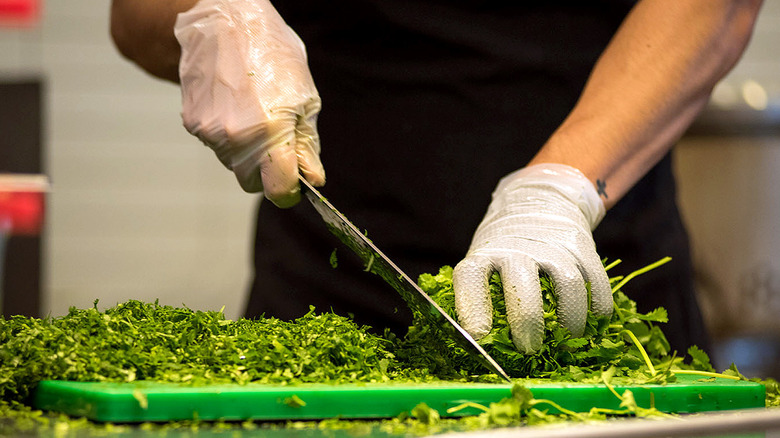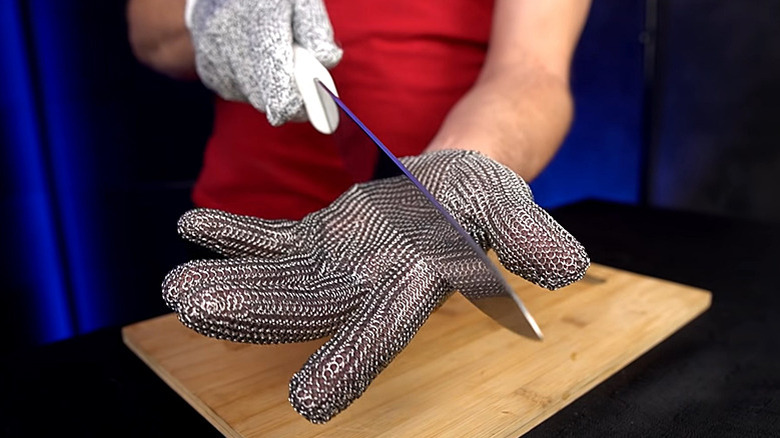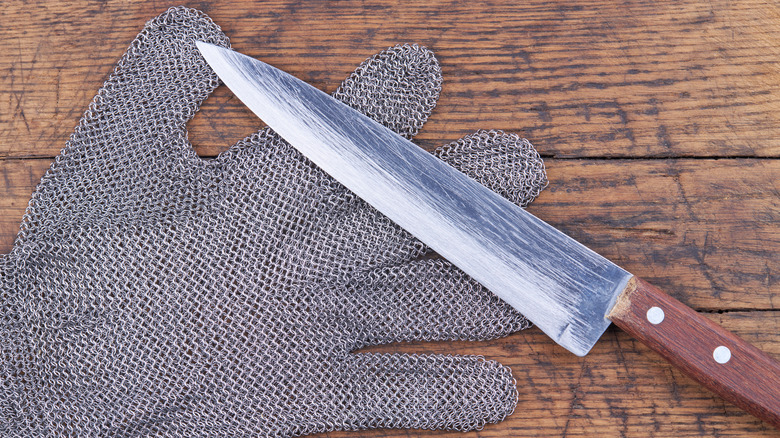Why Chipotle Employees Have To Wear Chainmail Gloves For Food Prep
We may receive a commission on purchases made from links.
One of the draws of eating at Chipotle is that the fast-casual restaurant chain prepares its food fresh daily. It's amazing how the employees manage to deftly wrap those giant burritos without tearing the tortilla or missing so much as a single bean. Along with the expertise needed to make all that look easy, the staff are also trained in basic knife skills. When you consider the large amount of vegetables and proteins that need to be prepared at each individual location every day, there's a whole lot of chopping going on.
From the avocados, tomatoes, onions, chilis, lemons, cilantro, and corn that go into the restaurant's fillings and salsas, to the chicken, beef, and pork that comprise the menu's meat options, it all needs to get cut up. But no matter how well-trained Chipotle's crew may be, accidents can happen — and that's where the cut glove policy comes in. Employees are taught stringent food prep safety procedures, which include the use of chainmail gloves to reduce the risk of knife accidents. Formally known as cut-resistant gloves, they are designed to protect against cuts, slices, and punctures.
According to a discussion on Reddit, the glove policy is in the company's training orientation video that instructs staff to wear the safety gloves whenever cutting food. Furthermore, the commenters claim that violating this requirement and then ending up cut can incur the injured party a fine of $5,000, as well as lead to the employee or their store manager being fired.
Chipotle's chainmail food prep gloves prevent injuries
Not unlike what Medieval knights wore under their suits of armor, chainmail gloves are made of tiny metal rings woven together to form a protective barrier against sharp objects. While iron was used in the gear worn by ancient warriors, stainless steel is now used to manufacture the modern equivalent. The material is hygienic, resistant to oil and rust, and can be easily cleaned and sanitized.
Given the copious amount of food that needs to be prepared in Chipotle's fast-paced environment, cut-resistant gloves provide an extra layer of protection from kitchen mishaps. Based on the most recent data available from the U.S. Bureau of Labor Statistics, in a 2020 report on nonfatal injuries that required days off work, cuts and lacerations for food services totaled over 7,000. It's easy to see why anything that can help to bring those numbers down is a good thing.
Cut-resistant gloves are not new or exclusive to Chipotle. Also known as oyster shucking gloves, the layer of chainmail is helpful in preventing punctures when opening the shells of oysters and clams. In his book, "Good Eats: The Final Years," Alton Brown jokes while discussing how to shuck oysters like a pro that chainmail gloves could be used to safely feed a shark. While we don't recommend trying that, they are used in the food industry to prevent harm from mandolines and slicers, as well as in delicatessens and by butchers and meat processors.
How cut-resistant gloves are used
For effective safety protocol and to keep the food prep process sanitary, Chipotle's staff must follow a triple-layered gloving routine. First, the worker dons a disposable plastic glove, then the metal glove, and then on top of that, one more plastic glove. This system was confirmed by a Business Insider reporter who visited Chipotle's NEXT Kitchen in Manhattan to get the scoop on what it's like to work there for a day. They also described that the cut-resistant glove is only worn on the hand not holding the knife, as that's the hand most likely to get injured when cutting or chopping.
While nothing can absolutely prevent knife slip-ups, wearing protection can reduce the likelihood of serious injuries. Chainmail gloves are only meant to be worn when using handheld kitchen knives, however, and are not suitable with electric tools — they are dangerous around machines with moving parts on which they could get snagged.
Cut-resistant gloves come in other textiles as well. Kevlar is heat- and impact-resistant and is the same material used in bulletproof vests. Dyneema is cut-resistant and offers protection against chemicals. Spectra fiber offers similar cut protection while also being moisture-resistant. Nevertheless, chainmail is considered most effective in kitchen environments, with the benefits of being long-lasting and able to withstand sterilization. You can expect to keep seeing them in use, at least until robots take over all the riskier tasks, such as Chipotle's "Autocado" automated guacamole prep machine, which is still being tested.



